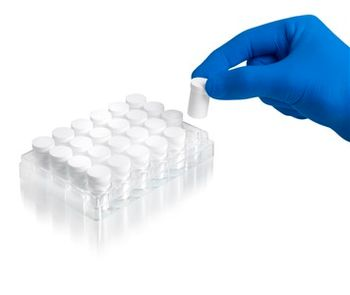
Come and see this Versatile 3D Cell Culture Method on TAP’s Booth #1159 at SOT
TAP Biosystems, a leading supplier of innovative cell culture systems and consumables for life science applications will be unveiling its latest development in 3D cell culture, the RAFT™ 24 well Kit on Booth #1159 at the Society of Toxicology (SOT) Meeting. The kit can produce realistic, reproducible single or multiple 3D cell cultures in physiologically relevant collagen scaffolds and could improve the results of a range of cell based assay models including those suitable for in-vitro toxicology models.
The new RAFT 24-well kit has been developed in response to researchers’ requests for a 24-well format to generate single or multiple collagen-based 3D cell culture models, ready for in-vitro toxicology research. The kit is packaged individually to give ultimate flexibility in producing the number of cultures required, without any wastage of consumables or reagents. The new kit leverages the novel RAFT collagen-based process and works with specially-developed reagents and a plate heater to generate 3D cell cultures using a simple protocol, in less than an hour.
The 24-well kit is the latest addition to the RAFT 3D cell culture portfolio that includes an automation-friendly 96-well version, as well as a kit for 3D cell culture using inserts, enabling researchers to use the RAFT system in a range of therapeutics areas for cell-based screening, modelling and research.
On the booth, TAP’s staff will demonstrate how scientists simply mix the reagents from the RAFT kit with their choice of cells at the desired cell seeding densities, pipette into their preferred type of 24 well plates (Corning, Greiner Bio-One, Millipore and Nunc plates are compatible) and incubate for 15 minutes at 37oC to form a cell-seeded collagen hydrogel. The RAFT absorbers are placed manually onto the hydrogels, and in just 15 minutes the medium is wicked gently into the absorbers, leaving cells encapsulated in physiological strength collagen. This 3D cell culture is then suitable for use in in-vitro cell-based assays using analytical techniques such as cell proliferation and immunofluorescent imaging.
Dr Grant Cameron, TAP Biosystems’ RAFT Development Director commented: “There is an increasing demand for realistic 3D cell culture models for toxicology testing because working with a more realistic cellular environment has the potential for improved translational results. 3D cell culture is not used routinely as many researchers have found this technology too expensive, technically demanding and can produce variable results.”
Cameron concluded: “We’re pleased to showcase our new 24-well RAFT Kit at SOT, the world’s largest forum for toxicological research because it can deliver collagen-based, reproducible 3D cell culture models that would be ideal for in-vitro research. Scientists looking for a cost-effective, versatile method of routinely incorporating 3D cell cultures in their toxicity screening programmes should come and visit us on Booth #1159.”
